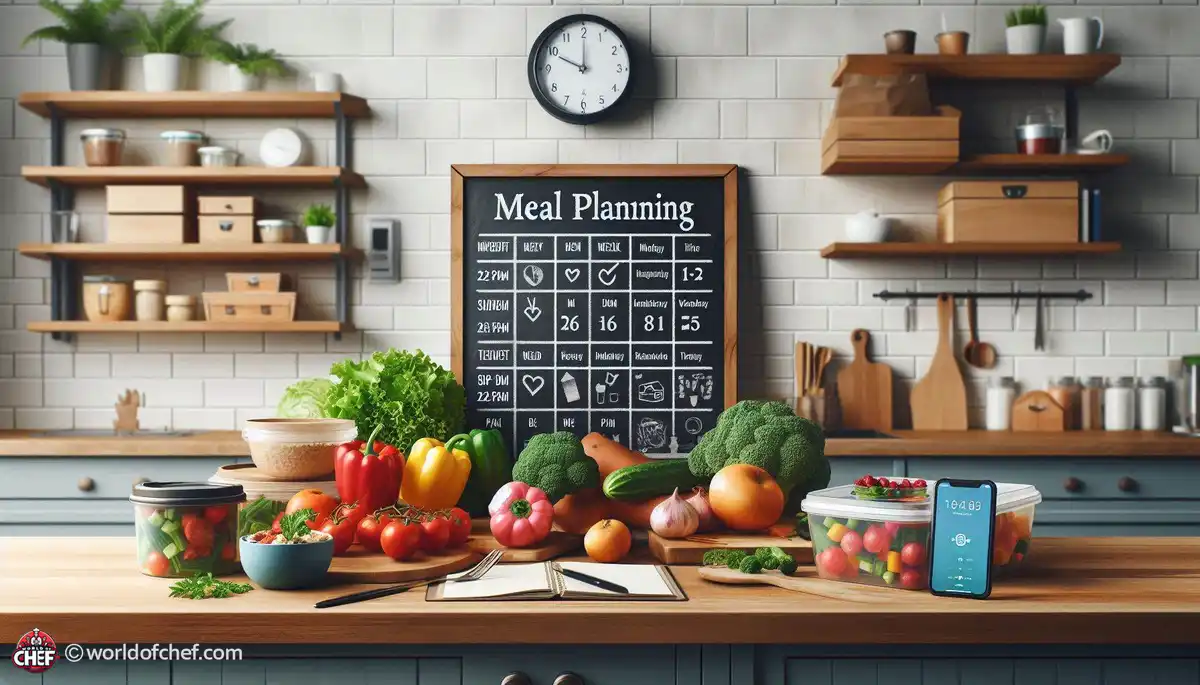
Planning Dairy-Free Meals for Weight Loss Success
Tony Wallin - Oct 28, 2024 - 18 min read


In today’s fast-paced world, finding time to cook healthy meals can feel like an overwhelming challenge. Many people juggle work, family, and social commitments, often leaving little room for meal preparation. However, with effective meal planning, it’s entirely possible to eat well without sacrificing your schedule. This blog post will guide you through some practical strategies to streamline your meal planning process, making it easier to enjoy nutritious meals even on the busiest of days.
Meal planning is the process of preparing a menu of meals for a certain period, typically a week or a month. By taking a little time upfront to decide what you'll eat, you can save yourself a lot of stress later. This practice involves choosing recipes, making a shopping list, and often prepping ingredients in advance. It can transform your Cooking Routine, allowing for more organized grocery shopping and reducing last-minute food decisions that often lead to unhealthy choices.
Incorporating meal planning into your routine can significantly cut down on food waste and save you money. When you have a clear idea of what you need to buy, you’ll be less likely to impulse shop and buy items that don’t get used. This proactive approach means you’ll have all the necessary ingredients on hand, making it easier to whip up meals, even when you’re pressed for time.
Before diving into meal planning, it’s essential to assess your schedule realistically. Take a moment to look at your weekly commitments and identify when you have the most and least time to cook. Are there days that are consistently busier than others? Understanding your own rhythm can help you create a plan that fits seamlessly into your life.
Once you have a grasp on your weekly routine, you can set goals for meal preparation that align with your available time. For instance, if you know that Wednesdays are particularly hectic, you might plan for simple, quick meals or leftovers on that day. This kind of strategic planning allows you to prioritize your energy and time, ensuring that you don’t feel overwhelmed.
When selecting recipes for your meal plan, aim for simplicity. Look for dishes that require minimal ingredients and cooking time. One-pot meals, sheet pan dinners, and slow cooker recipes are great options for busy individuals. Not only do these meals reduce the number of dishes you’ll need to clean, but they also allow for easy preparation.
Additionally, consider recipes that are versatile. Dishes like stir-fries or grain bowls can be adapted with whatever ingredients you have on hand, reducing the need for extensive shopping. By focusing on simplicity, you can create meals that are both nutritious and quick to prepare, making it easier to stick to your plan.
A rigid meal plan can lead to frustration, especially when unexpected events occur. Instead of planning out each meal for the week, consider creating a flexible framework. Choose a few proteins, grains, and vegetables that you enjoy, then mix and match throughout the week. This way, you can easily adjust based on what you feel like eating or what’s available in your fridge.
Flexibility also allows for spontaneity. If you discover that you have leftover ingredients from a previous meal, you can incorporate them into your plan without feeling constrained. This adaptability not only keeps your meals exciting but also helps prevent food waste, ensuring that everything in your kitchen gets used.
An organized grocery list is one of the most effective tools for successful meal planning. After selecting your recipes, create a list that includes all the ingredients you’ll need. Group items by category—produce, dairy, grains, etc.—to make your shopping trip more efficient. This approach saves time and helps you avoid forgetting key ingredients.
While you’re at the store, keep an eye out for sales or seasonal produce that can enhance your meals. Adapting your recipes to include these items not only makes your meals fresher but can also help save you money. By shopping smartly, you’ll have everything you need to stick to your meal plan without unnecessary stress.
One of the most effective ways to simplify cooking during a busy week is to dedicate time to meal prep. This can include washing and chopping vegetables, marinating proteins, or even cooking entire dishes in advance. By taking care of these tasks on a quieter day, you can significantly reduce the time you spend cooking during the week.
Consider batch cooking staples like grains or legumes that can be easily added to various meals. Portioning out snacks and meals into containers also makes it easier to grab something healthy on the go. This preparation not only saves time but also makes it less tempting to reach for unhealthy options when you’re in a hurry.
Leftovers can be a lifesaver for busy individuals. Instead of viewing them as an afterthought, think of them as opportunities for new meals. For example, leftover roasted chicken can be shredded and added to salads, tacos, or soups. By creatively repurposing your leftovers, you can keep meals interesting while minimizing food waste.
Additionally, consider storing leftovers in clear containers so they’re easily visible in your fridge. This visibility serves as a reminder to use them up, making it less likely that they’ll be forgotten. Embracing leftovers not only saves time but can also contribute to a more sustainable kitchen.
While home-cooked meals are often seen as the healthiest option, there’s nothing wrong with incorporating some store-bought convenience foods into your meal plan. Items like pre-cut vegetables, rotisserie chicken, or frozen grains can save you a significant amount of time in the kitchen. These products can be particularly useful on nights when you simply don’t have the energy to cook.
When choosing convenience foods, aim for options that are minimally processed and contain fewer additives. Reading labels can help you make healthier choices. By integrating these convenient items into your meal planning, you can enjoy balanced meals without the stress of extensive preparation.
Staying motivated while meal planning can sometimes be a challenge, especially if you feel stuck in a rut. To combat this, seek out inspiration from various sources. Cookbooks, food blogs, and Social Media platforms can provide fresh ideas and creative recipes. Following accounts that focus on quick and healthy meals can ignite your passion for cooking.
Additionally, consider sharing your meal planning journey with friends or family. Having a support system can encourage you to stay committed and share ideas. You might even set up a meal swap with friends where you exchange dishes. This not only diversifies your meals but also creates a sense of community around food.
At the end of each week, take some time to evaluate your meal planning efforts. What worked well? What didn’t? Reflecting on your successes and challenges can provide valuable insights that help you refine your approach. You might discover that certain recipes are winners, while others may not suit your taste or schedule.
By regularly assessing your progress, you can continue to improve your meal planning strategies. This reflection encourages growth and adaptability, making it easier to stick with your meal planning routine long-term. Remember, the goal is to create a system that works for you, making healthy eating enjoyable and stress-free.
Meal planning on a tight schedule doesn’t have to be a daunting task. By understanding the fundamentals of meal planning, setting realistic goals, and embracing flexibility, you can create a routine that fits your lifestyle. With the right recipes, smart grocery shopping, and effective meal prep, you can enjoy delicious and nutritious meals without feeling overwhelmed. Whether you’re a busy professional, a parent, or simply someone who wants to eat healthier, these tips can help you succeed in your meal planning journey. So, roll up your sleeves, get organized, and enjoy the benefits of planning your meals in advance.

Tony Wallin - Oct 28, 2024 - 18 min read

Phillip Roderick - Oct 28, 2024 - 15 min read

Alice Saxon - Oct 28, 2024 - 11 min read

Aria Osuna - Oct 28, 2024 - 16 min read